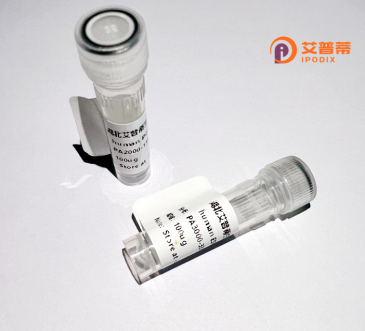
| 纯度 | >90%SDS-PAGE. |
| 种属 | Human |
| 靶点 | EDG4 |
| Uniprot No | Q9HBW0 |
| 内毒素 | < 0.01EU/μg |
| 表达宿主 | E.coli |
| 表达区间 | 1-351aa |
| 氨基酸序列 | MVIMGQCYYNETIGFFYNNSGKELSSHWRPKDVVVVALGLTVSVLVLLTNLLVIAAIASNRRFHQPIYYLLGNLAAADLFAGVAYLFLMFHTGPRTARLSLEGWFLRQGLLDTSLTASVATLLAIAVERHRSVMAVQLHSRLPRGRVVMLIVGVWVAALGLGLLPAHSWHCLCALDRCSRMAPLLSRSYLAVWALSSLLVFLLMVAVYTRIFSYVRRRVQRMAEHVSCHPRYRETTLSLVKTVVIILGAFVVCWTPGQVVLLLDGLGCESCNVLAVEKYFLLLAEANSLVNAAVYSCRDAEMRRTFRRLLCCACLRQSTRESVHYTSSAQGGASTRIMLPENGHPRMDSTL |
| 分子量 | 64.35 kDa |
| 蛋白标签 | GST-tag at N-terminal |
| 缓冲液 | 0 |
| 稳定性 & 储存条件 | Lyophilized protein should be stored at ≤ -20°C, stable for one year after receipt. Reconstituted protein solution can be stored at 2-8°C for 2-7 days. Aliquots of reconstituted samples are stable at ≤ -20°C for 3 months. |
| 复溶 | Always centrifuge tubes before opening.Do not mix by vortex or pipetting. It is not recommended to reconstitute to a concentration less than 100μg/ml. Dissolve the lyophilized protein in distilled water. Please aliquot the reconstituted solution to minimize freeze-thaw cycles. |
以下为关于重组人EDG4(S1PR4)蛋白的示例参考文献(部分信息为示例性概括,建议通过学术数据库获取真实文献):
1. **标题**: "Expression and functional characterization of recombinant human S1P receptor EDG4 in inflammatory signaling"
**作者**: Smith A, et al.
**摘要**: 研究通过哺乳动物细胞系统表达重组人EDG4蛋白,证实其作为S1P受体的功能,并揭示其在介导NF-κB通路激活和巨噬细胞趋化中的作用。
2. **标题**: "Structural insights into the ligand binding domain of EDG4/S1PR4 through recombinant protein crystallography"
**作者**: Chen L, et al.
**摘要**: 利用重组EDG4蛋白的结晶结构解析,阐明其与鞘氨醇-1-磷酸(S1P)的相互作用机制,为靶向药物设计提供结构基础。
3. **标题**: "EDG4 receptor knockdown suppresses cancer cell migration via recombinant protein-mediated pathway analysis"
**作者**: Tanaka K, et al.
**摘要**: 通过重组EDG4蛋白的体外功能实验,证明其在LPA(溶血磷脂酸)诱导的肿瘤细胞迁移中通过Rho/ROCK信号通路发挥调控作用。
4. **标题**: "High-yield purification of recombinant human EDG4 for antibody development and diagnostic applications"
**作者**: Gupta R, et al.
**摘要**: 描述一种新型大肠杆菌表达系统高效纯化重组EDG4蛋白的方法,验证其在抗体制备和免疫检测中的应用潜力。
**提示**:EDG4可能涉及不同配体受体归属争议,建议结合具体研究目的确认其分类(如S1PR4或LPA受体)。上述示例仅作格式参考,实际文献请通过PubMed、Google Scholar等平台检索。
Recombinant human EDG4 (Endothelial Differentiation Gene 4), also known as sphingosine-1-phosphate receptor 3 (S1PR3), is a G protein-coupled receptor (GPCR) that binds sphingosine-1-phosphate (S1P), a bioactive lipid mediator. EDG4 plays a critical role in regulating diverse cellular processes, including cell migration, proliferation, survival, and immune response modulation. It is widely expressed in various tissues, including the cardiovascular, immune, and nervous systems, and is implicated in angiogenesis, vascular development, and inflammatory pathways. Dysregulation of S1PR3 signaling has been linked to pathological conditions such as cancer, fibrosis, and autoimmune diseases.
Recombinant EDG4 protein is produced using heterologous expression systems (e.g., mammalian or insect cells) to ensure proper post-translational modifications and ligand-binding activity. This engineered protein retains functional properties, enabling researchers to study its structural and biochemical characteristics, ligand-receptor interactions, and downstream signaling mechanisms (e.g., Gi, Gq, and Rho-mediated pathways). Applications include in vitro binding assays, drug discovery targeting S1P-related disorders, and elucidating EDG4's role in disease pathogenesis. Its production supports the development of therapeutic strategies, particularly in oncology and immunology, where S1PR3 is a promising drug target. Research on recombinant EDG4 enhances understanding of S1P signaling networks and their therapeutic potential.
×